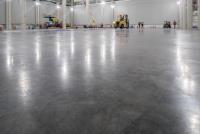 Add My Company
Add My Company
Sign In

At first glance, polyurethane flooring (PU) and epoxy floors can seem very similar. Both are types of resin floor after all. But when you’re selecting a flooring solution for your business, it’s important that you choose the right one.
In a recent article, Australian publication Architecture and Design highlighted the main differences between the two kinds of resin flooring, as well as explaining when you should use which.
Before you start worrying about the aesthetics of your flooring, you need to ensure you choose one that can handle the demands that will be placed on it.
As a general rule, PU flooring is harder wearing than epoxy flooring. The news provider explained that PU flooring is the one to choose if you’re looking for a solution that can handle high footfall, heavy machinery, extreme temperatures and corrosive chemicals.
PU flooring works particularly well in industrial settings because of its highly durable nature. It can also withstand much more extreme temperatures than epoxy flooring - for instance it will be heat resistant to 120 degrees C, compared to 65 degrees C for epoxy options.
So, if you’re looking for a hard-wearing flooring for an industrial setting, in the food and beverage sector, or somewhere like a garage, PU flooring is probably a better option.
You could be forgiven for thinking that, with such a durable nature, PU flooring would be better in every setting. But there are some situations where epoxy flooring is superior.
According to the website, epoxy flooring is a better choice in settings where you want a hard-wearing surface, but one that gives you greater control of the design and colour. Epoxy flooring comes in a much wider range of colours and finishes.
Make no mistake, it’s still a highly durable flooring option, even if it’s not quite as hard wearing as PU flooring. This means you can use it in large-scale commercial environments, such as shopping centres, or even office buildings, where there will be a lot of footfall.
Epoxy floors are also lighter than their PU counterparts, making them a more appropriate choice in areas where weight may be an issue.
Because of their versatility on the colour front, they can be designed to match any colour scheme and even to fit in with corporate branding.
You may also decide that your premises would benefit from a mix-and-match approach, with PU flooring in the areas that will see the heaviest traffic and take the most punishment, and epoxy floor coating in customer-facing areas that won’t be put under quite so much strain.
The most important thing, according to the publication, is to choose the right floor for your needs. It’s not about one being superior to the other in every sense, but about thinking carefully about what kind of flooring is best suited to a specific environment.
As far as possible, try not to make your decision based on cost alone. We recently pointed out that choosing the wrong floor coating for your needs because you’re trying to save a bit of money will often end up costing more in the long run when you factor in repairs, and potentially replacement flooring further down the line.
For more information on DO YOU KNOW THE DIFFERENCE BETWEEN PU AND EPOXY FLOORING? talk to Polycote UK
Enquire Now
List your company on FindTheNeedle.

